Kissing Books: Le grande geste
Every month, Olivia Waite pulls back the covers, revealing the very best in new, and classic, romance. We're extending a hand to you. Won't you take it? And if you're still not sated, there's always the archives.
Jane Austen’s most popular proto-romances are rather ambivalent when it comes to the grand gesture.
In Pride and Prejudice, Darcy of course tries to hide his generosity from the Bennet family: he swears Lydia to secrecy (as if that was ever going to work) and gets palpably awkward when Elizabeth dares to break silence and thank him for it.
In Persuasion, published posthumously, there is no final grand gesture at all — a single letter, secretly delivered, brings our characters into harmony with one another. An earlier version of the story saw Captain Wentworth being maneuvered into asking Anne Elliot about her assumed plans for matrimony — which has a little bit of the savor of the grand gesture’s public risk — but in the end Austen edited this out in favor of something much more intimate.
Now, of course, after two hundred years of books, films, and television love stories, romance aficionados have come to anticipate sweeping declarations/acts of atonement like so many now enshrined in the RomCom Canon. Boomboxes held up beneath a window, cue card confessions on a snowy London street, blue French horns stolen from candlelit restaurants, pop tunes belted into a microphone with a surprise marching band accompaniment. A declaration in front of the Queen. One thousand anguished airport pursuits.
The modern grand gesture is painfully, necessarily public, shading sometimes into cringing embarrassment (on the part of a character, or sometimes the audience).
One imagines Jane Austen would be appalled.
I can’t help but speculate a little on how this lines up with the division between love (as sexual/romantic affection, courtship, partnership) and marriage (as social structure, alliance, dynastic strategy, or government institution). Current Western culture takes it as a given that love is what marriage is for — but any half-hearted glimpse into history will show just how recent an innovation that attitude really is (one not-too-ivory-towerish recommendation: Marriage, a History by Stephanie Coontz). Jane Austen is one of the first writers of what’s come to be called companionate marriage — but her ambivalence still preserves a line between love (personal), and marriage (societal).
It is not a politically neutral question to expect true love to be public.
Disability can affect a person’s access to public space, attention, and consideration. Anti-miscegenation laws were on the books in living memory. Queer couples’ confessions of love involve quite different risks than do those of the hetero setero. Romances novels that engage with these margins often end up looking rather Austenish: quiet, intimate, even a bit secret. Or else the public/personal division is part of the central problem — take Casey McQuiston’s Red, White, & Royal Blue for example, or Alyssa Cole’s brilliant Loyal League series.
I don’t have any earth-shattering, actionable insights about all of this. It’s just been a bit on my mind. Christmas is harvest-time for romantic comedies (with or without ghosts) and this is the part of the pattern I’ve been trying to puzzle out.
This month’s books are a mix of quiet revelations and all-out spectacle. On the quiet side we have a pair of 1920s queer ladies, two disaster bi lovebirds in small-town California, and a couple on opposite sides of an urban garden. On the side of spectacle: two Regency naturalists in a rom-com retelling and a jewel thief wooing a prickly detective with stolen opals and self-abnegation.
(Note: I will be taking the month of December off, so I will see you back here in January with hopes for a fresh new year!)
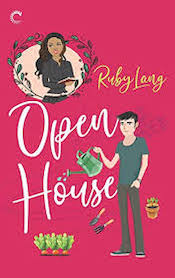
Open House by Ruby Lang (Carina Press: contemporary m/f):
This second book in Ruby Lang’s dazzling Uptown series (they stand perfectly wonderfully on their own, companions rather than a continuity) features a real-estate broker drowning in student debt and an accountant turned reluctant organizer, who square off over the fate of a renegade community garden in Harlem. It’s witty, it’s thoughtful, it’s a little bit of a heartbreaker. And it may be one of the best uses of the We Can’t Both Win trope that I have ever, ever seen.
We Can’t Both Win asks one of the most powerful questions in romance–or really in all philosophy: how do we resolve the unresolvable? Who has to compromise, to bend, to give in? And why? In romance the answer is always love, of course–but the characters can’t give in for generalized, abstract capital-L-Love. That’s a cop-out and we know it.
No, the best resolutions here involve something specific, and it has to be at least a little bit of a surprise for the reader. That’s how you get the deepest gut-punch of the emotional payoff.
This book gets it. No, I’m not going to spoil it for you. Just know that it was perfect and I wish I could reread it a thousand more times.
Ruby Lang continues to shine, her prose the best kind of snappy contemporary writing–and then it started knocking me flat on my ass. Magda and her perennially disappointed sisters. Oliver and his grumpy friendships with the elderly women gardeners. The stubbornness of grief, the struggle to get one’s life back on track, the way lust and attraction can blossom into affection and loyalty and joyful sacrifice.
And the sex scenes? Whooo boy. I was a wreck. There’s one in a blacked-out New York that I’m going to be thinking about for years to come.
If you need a little bit of springtime as the leaves begin to fall, this is the book to reach for.
”One bed,” he repeated stupidly, his brain spiraling out in inappropriate ways.
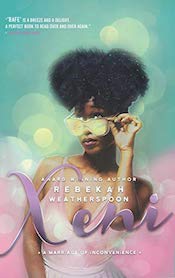
Xeni by Rebekah Weatherspoon (contemporary bi m/bi f):
Rebekah Weatherspoon writes the best people. Just the best: big, burly hunks with thighs like oak and hearts as tender as springtime, smart and scrappy witches taking charge of themselves and their lives even when the shit’s hitting the fan, queer folks and found families for days. This book is the follow-up to Rafe and is just as much of an escape and a joy — only instead of a buff, tattooed male nanny, we’re treated to a beautifully fat, bisexual Scotsman (with the accent!) named Mason, who plays seventeen instruments, cooks for a living, and would really enjoy being pegged.
Oh, and according to her late aunt’s will, Xeni has to marry him in order to inherit a family fortune. What is a grieving bisexual witch supposed to do?
Take the gorgeous man to bed, of course — because it would be fun, and her friends are far away, and funerals are awful, and her family’s giving her hell, and sweet, sexy Mason is the best thing about this whole mess Xeni has found herself in.
I’m going to do give you a lengthier than usual excerpt: I just want to show you the sheer pleasure of watching these two people in challenging circumstances find ways of connecting and being kind to one another. (And then banging for days, of course, but you’ll have to pick up a copy of your own if you want to see the sexy stuff.) It’s a joy and a gift to the reader, in the author’s boldly generous style.
She didn’t realize the ground was damp until she’d let her weight settle into the grass, and she couldn’t bring herself to care. She couldn’t be bothered with the small group of mourners who were watching her lose her shit. Xeni pulled her knees to her chest and then stared at the water. She wanted to cry, desperately needed to, but her body refused. Still, she needed just a moment to try and take it all in. She had about three seconds to pretend her pain was private before the unmistakable drone of bagpipe music rose behind her. Xeni had forgotten how fucking loud the bagpipes were. She closed her eyes against the sound and forced herself to breathe.
It was another ten seconds or so before Xeni realized what song he was playing. “Another One Bites the Dust” was a hilarious selection for a send off, but maybe not the most appropriate. Her head turned automatically. For some reason, she didn’t expect to see Mason looking back at her, his large brown eyes rimmed red. He continued to play even as she raised an eyebrow at him, questioning what exactly the fuck was going on, but all he did was shrug and roll his eyes, the sadness on his face disappearing for just a moment. Right. It wasn’t his song choice.
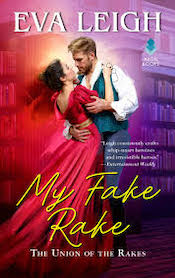
My Fake Rake by Eva Leigh (Avon: historical m/f):*
My favorite new critical tool from this year (thanks to Jennifer Hallock) is the chronotope: a specific way of representing time and space in fiction. Regency romance is a chronotope — and so, of course, is high school. From noir-inspired mysteries like Brick to Jane Austen-in-Los Angeles in Clueless to Shakespeare retellings like 10 Things I Hate About You, turning classic literature into high school narratives is something of a cottage industry.
My Fake Rake is the rare reverse: a genderswapped She’s All That where the hero is the one getting the makeover, set among the intellectual set in Regency England. It’s also the first book in a new series, based around five former schoolmates who bonded after one day’s discipline.
Yes, it’s a Regency Breakfast Club. Yes, I loved it.
The translation works because high schoolers and 19th-century aristocrats are both groups obsessively fixated on social status, sex, and money. Also dancing! (The waltz scene in this book was unusually gorgeous.) I giggled through half of it and cried through the rest. I’m on record as being a staunch fan of Eva Leigh (and her Zoe Archer books as well) and this is some of her best work.
Lady Grace Wyatt is wealthy and brilliant and wants a partner who can share her passion for natural history. She knows just the man, a dashing explorer — except he admires her mind, and has made it painfully clear he sees her only as a mind, not as a marriage prospect. What better way to catch his eye and spur his interest than by being courted by a fashionable, flirtatious dandy?
But Grace doesn’t know any dandies. She knows Sebastian Holloway, anthropologist and one of her closest friends. Who, if he removed his spectacles, would be rather stunningly attractive. And who, unbeknownst to Grace, has been half in love with her ever since he loaned her a pencil on her first visit to the library all those years ago.
At this point in the description, you already know if you’re in or you’re out. This is the purest kind of melodrama, fluffy but with moments of raw angsty goodness, and a rather spectacular amount of drama at the end. It is completely over the top and full-commitment in every way, and I had an amazingly good time throughout.
Before Grace could object, the duke plowed on. “In any event, I would ask you to take note of the men outside, and how they interact with the ladies. Not the older gentlemen who’ve settled into a comfortable middle age. The younger set.”
“The ones with the tightest breeches,” Grace noted. Her pencil moved in rapid strokes. “Showing off their thighs in an evident courtship display. Very common within the animal kingdom.”
“Are you sketching?” Seb asked. “Male thighs?”
She rolled her eyes. “Of course. We have to use every available avenue to record our findings.” Grace held up her journal, and, true enough, she’d marked the paper with very accurate drawings of male femoral regions. She hadn’t neglected the crotch areas, either.
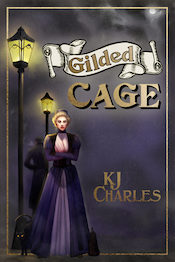
Gilded Cage, by KJ Charles (self-published: historical m/bi f):
I’ve been waiting many months for this book. The one where we finally get to spend a whole novel basking in the razor-edged light of Susan Fucking Lazarus, spiritualist fraud turned detective turned terror of the London criminal classes.
And my god, she’s just as glorious as I’d dared to hope.
This novel is as finely balanced as a blade from a master smith. The steely weight of a mystery plot, where our hero Templeton Lane’s life hangs in the balance as a jewel thief being framed for murder. The gleam of a second-chance romance, with its long-simmering resentments and reveals, which delivers several punches to the reader’s gut. And the sharpest, cuttingest banter this side of a screwball comedy. Our characters have deep feelings, impossible longings, and wracking vulnerabilities; quite naturally, these commonly express themselves as insults, denials, and wry asides. It makes the few moments of pure, shining sincerity burst like fireworks and make me silently cheer.
Susan is wary and intelligent and hedges her bets whenever possible. She hides her emotional truths as deeply as she can, even from herself. She hardly turns a hair when lying to the police, pursuing leads, interrogating suspects, or doing any one of a number of reckless, questionable things in the pursuit of justice. But ask her to explore her feelings? Ask her to trust someone with her heart? Ask her to hope?” She’d rather swallow rusty nails.
Templeton Lane, our aristocratic younger son turned mining laborer turned jewel thief, is much the same, wounded and self-isolating — except that he is incapable of hiding how much he adores Susan Lazarus. It spills out of him at the most inconvenient moments. He has every reason to mistrust her after years of simmering silence, no reason to think she’d forgive him all the things he screwed up before. But he just can’t help himself. It’s not long before he’s offering everything — his presence, his absence, anything she might want from him — and contrast between this hapless yielding and Susan’s prickly principles just lights up the love scenes like gangbusters. Favorite characters from past books/series make elegant, effortless cameos, and justice when it finally comes is fierce, bloody, and grimly joyous.
All this and a stolen opal necklace, too. Heaven.
“You’re the last person alive with a reason to help me. You would have been first on my list of people to ask, given a choice.”
“I dare say I’m the only detective you know,” Susan pointed out, somewhat snidely. She wasn’t sure why she felt snide, but she did.
“I know plenty. You’re the only one we ever thought was dangerous. I’d prefer to have any three of the Metropolitan Police on my tail than you.”
Susan felt her cheeks pink, enragingly. “Yes, well.
This Month’s Twentieth-Century Historical With Queer Ladies
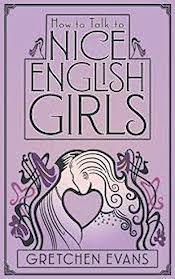
How to Talk to Nice English Girls by Gretchen Evans (Carnation Books: historical bi f/f):
Many of my favorite historical romances are ones that rebel against the Regency/Victorian chronotope. I am fond of midcentury romances, medievals, Tang Dynasty duologies, and increasingly, romances set in the 1920s, either British or American or pretty much anywhere else. There’s something endlessly flexible about the Roaring Twenties: you can go full glamor with flappers and bootleggers and the newly modern cities; you can go hardscrabble with self-made businessmen and young single women joining the public workforce in numbers for the first time; you can go dark with the trauma of the Lost Generation, or anarchy and the labor movement, or the rise of fascism that would so trouble the thirties and forties.
Or, as in the case of Gretchen Evans’ quiet but thoroughly engaging novel, watching two quite different women slowly figure out how to carve out a life together to spite uncaring society, disapproving family members, and their own worst tendencies.
This is a very precise, small-scope novel in terms of perspective. We spend the whole thing in one heroine’s head, and because Marian’s world has been kept so close and limited — she’s grown up in her pretty sister’s shadow, dutifully obedient to her parents, never traveling too far from the manor house where she was born — even the smallest changes can feel transformative and perspective-shifting. When her titled father’s American business partner brings along his brash, short-skirt-and-red-lipstick-wearing, booze-tippling daughter, well, it’s no wonder that Marian is dazzled.
But never swept too far out of her orbit of good sense and caution. I always worry, when novels begin with a quiet, biddable heroine, that she’s going to have to make some sort of enormous, reckless mistake for which she must atone. It stresses me out in advance. Spoilers — but we get nothing like that here. Marian’s inner steel is tempered by Katherine’s fire; Katherine’s rashness is grounded by Marian’s steady admiration. A delicate thread of narrative tension holds the whole thing together until the end. It is precisely as the title promises: nice.
Marian began brushing the sleep-pressed waves from her blonde hair. Unlike Cecilia’s, Marian’s hair was not pale blonde or luminous. It was darker, more like the colour of straw. It didn’t glow, it just looked dead and flat. It never seemed to catch the sun or shine in the lamplight at a ball. Everything about Marian felt like a rough imitation of Cecilia: her eyes were blue, but a light, unsettling colour that made her look far too clever to be trusted, her cheeks and jaw were pale and angular instead of rosy and round, and she never attracted others like Cecilia did. It was almost as if everything beautiful got used up in Cecilia and all that was left for Marian were the rough and faded bits.